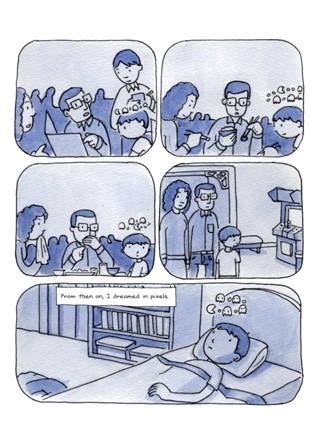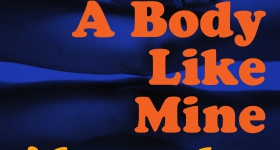Mom and Dad, try to contain yourself, but after reading Gene Luen Yang’s graphic novel Level Up, there was a fleeting moment in which I was convinced I should go to medical school.
I know you’re reading this, Mom and Dad, don’t take me seriously. I’m only kidding, really I am.
Mostly.
Level Up confronts the tension between staying true to yourself on the one hand, and being committed to familial duty on the other. As second- or third-generation Asian Americans, where is the line between choosing what you feel is right for you, and obeying the common family mandate to follow a professional career? Who really knows what’s in your best interest but you, but then again haven’t your parents paid enough dues and earned the right to have their say over your future? How much hardship need be endured in order to be successful in life?
Optimistically, Level Up suggests you can have your Tetris and play it, too.
With cover art and visual layouts that simulate a paginated Game Boy, its green screen alight, the graphic novel follows the life of Dennis Ouyang, a normal kid whose stages in life are presented to the reader like levels in a video game. Fittingly, gaming is Dennis’ true passion and talent, something he excels at so highly that he’s on the verge of being kicked out of college. That is, until four mysterious and adorably round-faced angels, images from a card his deceased father once gave him, show up to whip him into shape.

The fusing of reality with video games and otherworldly spirits should come as no surprise to those familiar with Yang’s work, in particular the ground-breaking American Born Chinese which blends magical realism into the structure and plot of the tale. In Level Up, Yang offers a new story for those school-aged readers of ABC who have graduated to struggles with career path discernment.
The four angels cook, clean, and pop quiz Dennis all the way to med school, taking care of everything so he can focus on his studies. They make him swear off video games for good, claiming it’s his destiny to become a gastroenterologist, which Dennis eventually buys into without even bothering to look up that it is “a branch of medicine concerned with disorders of the stomach, liver, and intestines.” Yang’s deft ability to marry tightly-woven themes with well-structured visuals shines as Dennis “loses a life” each chapter, losing a bit of himself to the compromises he’s made.
Further complications arise as Dennis settles into life at medical school with a group of friendly study buddies, while his four little angels vie for his attention and come to have distinct personalities of their own. Yang’s witty conversational humor pervades throughout the novel in well-timed spurts. Scenes are honest and deeply funny, highlighting the small moments that friendships are made of -- from study groups in diners to gossiping in class.
One of the most hilarious scenes in the book illustrates Dennis’ inconveniently weak stomach, as he and his classmates must take samples of their own poop, bring it into class, and analyze it in the lab. (Is this what really happens in med school? What horrific fun! Where’s this representation in all the glossy movie and tv dramadies?) Dennis tries to play it cool while comparing stools with his crush (somehow managing layers of banter and sexual tension in the conversation), but his puking in the bathroom casts further doubt on his chosen career path and specialization.
Complex relationships and personalities are sketched out with subtlety and nuance, through meaningful hand-drawn facial expressions and blank contemplative framed pauses. In contrast to the bursts of color that might be expected of a comic based on video games, the art by Thien Pham is a surprisingly subdued palette of grays, blues, and browns (is this a Game Boy thing I’m missing?), painted in simple but highly expressive watercolors.
Beneath the geeked-out video game references, literal potty humor, and surrealist human Pac-Man chases, are underlying anxieties about making your family proud, finding meaning in life, learning when and how to “eat bitterness,” and the real or perceived pressure to achieve success. Whether in the form of a Tiger parent (jeez, I swore to myself I wouldn’t make that reference) or little angels doing your dishes and pushing you forward, it’s about fulfilling your destiny, whatever that may be.
Not forgetting that this successful story was created by two Asian Americans who chose the artistic route, Level Up is touchingly dedicated to their “brothers … both of whom work in the medical field, for being the good Asian sons.”
So Mom and Dad, sorry but it still ain’t gonna happen. There won’t be any Dr. Wongs in the near future, because much more than applying to medical school, Level Up made me want to write comics and improve my video game aptitude. But of course, you should know I’m working hard to make you proud.










Comments